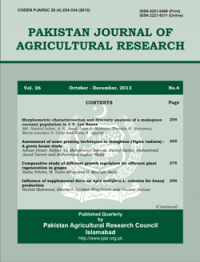Impact of Zero Tillage on Productivity of Traditional Mung Bean-Wheat Cropping System of Punjab, Pakistan
Imtiaz Hussain1, Azhar Mahmood Aulakh2, Muhammad Sohail1*, Khalid Hussain2, Ansaar Ahmed3, Abdul Hamid3 and Muhammad Imtiaz3
ABSTRACT
To share on other social networks, click on any share button. What are these?






